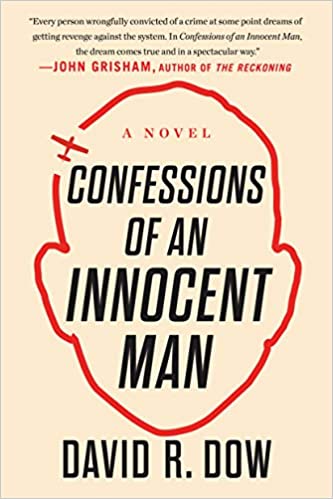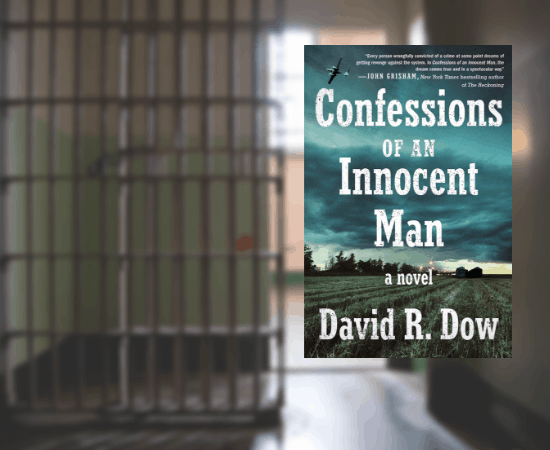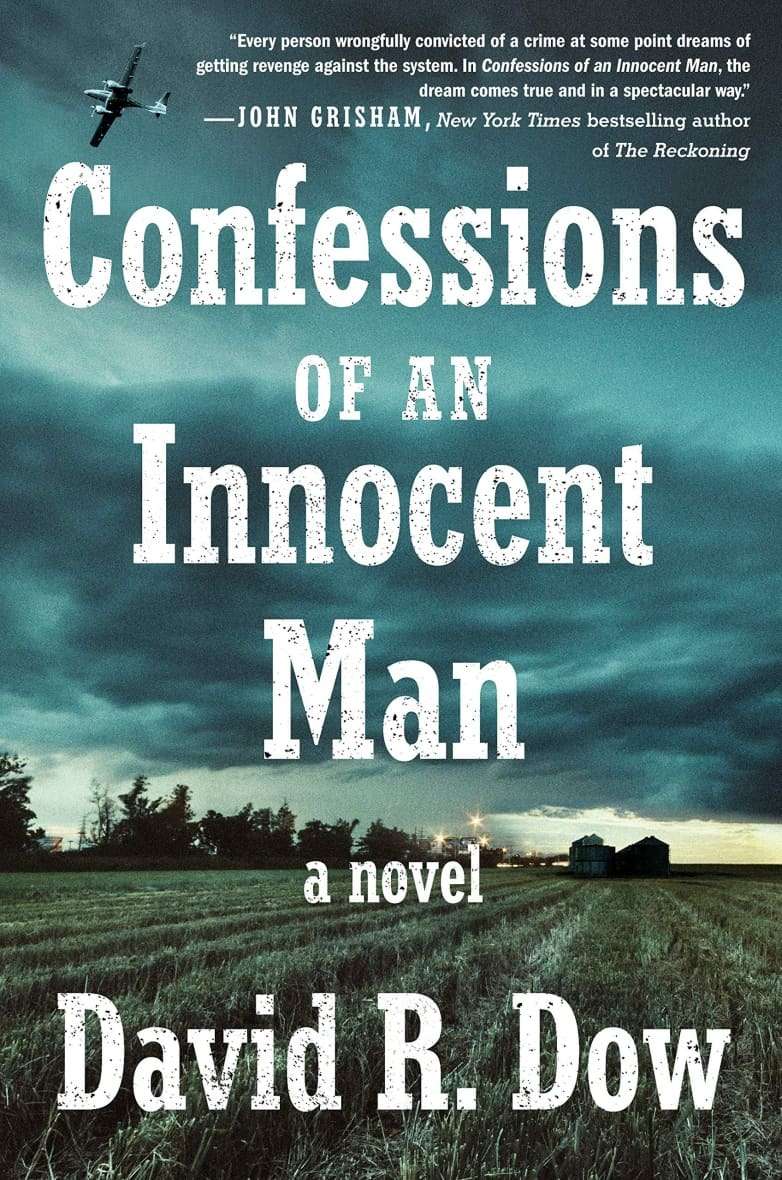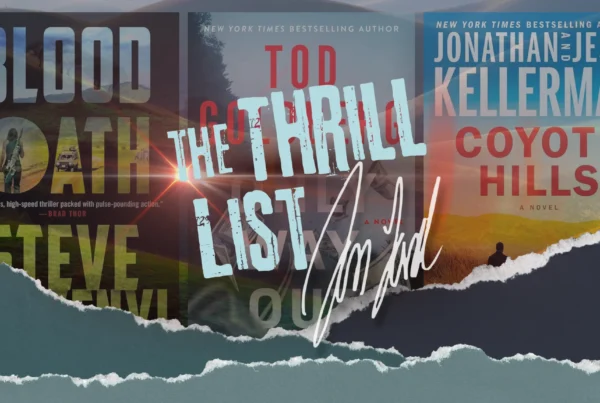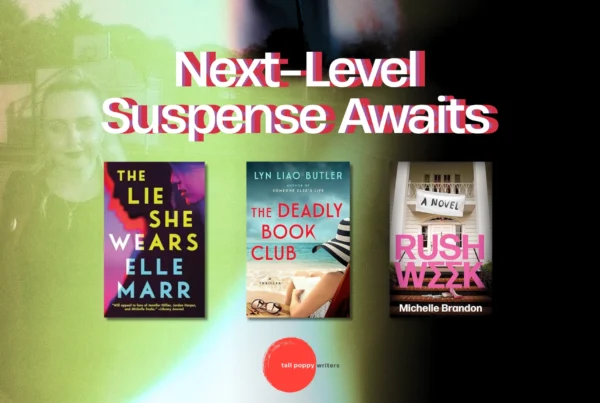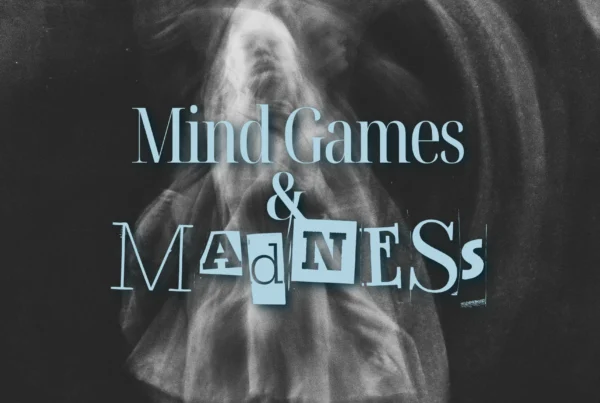Confessions of an Innocent Man by David Dow
For Rafael Zhettah, the chef and owner of an up-and-coming Houston restaurant, that day was when the police told him his wife of only two years had been murdered in their own home. The next worst day was when he found out he was the prime suspect. He had motive, opportunity, he’d been found with another woman, his fingerprints were on the murder weapon. But he insisted he was innocent.
“You can call me the harshest name you like, and I will not disagree….But there is one thing I am not. I am not a murderer.”
The judge and jury disagree. Texas is a death penalty state, with a very busy death row, and that is where he lands. His shock is enormous – and so is ours. We’ve all read books about life in prison, seen the movies and television shows, read newspaper accounts, heard the podcasts. Nothing, however, will prepare you for the sheer visceral reality of what David Dow gives us in Confessions of an Innocent Man (Dutton).
That is only part of the story, however. You’ll know from the prologue that he wasn’t executed, that he is out, a free man, though you won’t know how or why. You do know something more, though:
“I’ve read interviews of exonerated men, who spent years in prison before being released, and they always seem so serene and centered. They betray no hint of vengefulness or rage. I am not one of them.”
We’ve already been on a harrowing journey, full of twists and suspense. But as it turns out – the rollercoaster ride is only just beginning.
Confessions of an Innocent Man is an explosive novel, as page-turning a debut as you’ll read in quite a while. It is also one of the most authentic. David Dow is a law professor at the University of Houston and Rice University, and is the founder and director of the Texas Innocence Network. Together, he and a team of lawyers and students have represented more than one hundred death row inmates during their state and federal appeals. He is also the author of several nonfiction books, one of which Things I’ve Learned from Dying, was an NPR book of the year, and another, The Autobiography of an Execution, was a finalist for the National Book Critics award for autobiography.
His cause did not come easily to him, however. In The Autobiography of an Execution, he writes, “People think because I am against the death penalty and don’t think people should be executed, that I forgive those people for what they did. Well, it isn’t my place to forgive people, and if it were, I probably wouldn’t. I’m a judgmental and not very forgiving guy. Just ask my wife.” And later: “I understand the death penalty supporters. I used to be one. I can relate to the retributive impulse. I know people I want to kill.”
What changed his mind on the death penalty? Why did he make fighting it his life’s work? And how did all this affect the way he envisioned Rafael Zhettah and his character arc?
“I was representing death row inmates for close to five years before I went from being a tepid death penalty supporter to an opponent. Two things happened. First, I had a lawyer’s moment. Like many people, I had an image in my mind of the inmates on death row. I expected it was full of frothing, crazy guys, part Charles Manson and part Hannibal Lecter. In reality, of course, Manson himself was not actually on death row, and Lecter is a fictional character. But I still expected the row to consist of men like them. Then I went to the prison, and the guys I met looked just like me. It made me wonder what was so special about them. The death penalty is supposed to be reserved for the worst of the worst, but as best I could determine, the guys on death row were no more dangerous than guys in the general prison population.
“Over years of representing then, I learned why they are in fact there: because of their race, or the race of their victims, or the fatness of their wallets, or the zeal of particular prosecutors. I understand we live in a capitalist system. Rich people can afford to travel on private jets while others have to go on the bus; rich people get the best health care and eat at the finest restaurants. I get all that. But the criminal justice system is supposed to be the domain in society where wealth does not matter, where everyone, as the phrase carved at the Supreme Court says, receives equal justice under law. The simple fact is, there is no equality in the criminal justice system. Maybe that defect is ineradicable, but to me it means we should not be killing people. It’s one thing to say if you are rich you can eat filet mignon but if you’re poor you have to eat bologna. It’s another to say if you are rich you get probation but if you’re poor you get executed.
“Next I had a human moment. Part of being a death penalty lawyer is learning everything about your client. I mean everything. I know every house my clients have ever lived in, every school they attended, every doctor’s or hospital visit they had, every job they’ve held. I know three generations of their family tree. I know their girlfriends, boyfriends, or spouses. I know their brothers, sisters, moms, dad, grandparents, aunts, uncles, cousins, and children. I try to talk to every teacher and employer they had, and all their friends. I know their grades, their IQ scores, their childhood illnesses, what music they listen to, what sports they play, and whether they can read.
“I tell my wife I sometimes know more about my clients and their history than I do about hers. The point being: A good death penalty lawyer comes to know his or her clients as a human being, not just as a grainy mug shot of a guy who did a terrible thing. I’ve stood next to mothers and daughters as their sons and fathers were executed. The way the death penalty system survives is by denying the fundamental humanity of the people we execute. But if you are a lawyer representing one of those people, his humanity is something you cannot avoid.
“As for why this became my life’s work, all I can say is that I found representing these guys hard to walk away from, even though I have wanted to walk away a thousand times. It is not only very challenging work intellectually, but it is emotionally engaging. I’d say the work found me, rather than vice versa.
“But regardless of how I came to be doing the work, it influenced not only my conceptualization of Zhettah, but of all the other characters, too, from the lawyers to the inmates to the judges. Actors in the criminal justice system are easy to caricature, but those caricatures are false. I wanted to avoid creating more of them, and make these characters as real as the people I have gotten to know over the years.”
Part of his involvement also came from his own background.
“At one point in the book, Zhettah is described as a wayward Jew. That description probably applies to me. I grew up in a moderately observant family with deep knowledge of Jewish texts. Until I was in high school, I thought I might attend rabbinical school. There are rabbis on both sides of my family, and my youngest brother (I am the oldest of five brothers) is a rabbi in Jerusalem. At my family’s dinner table, we would talk about the Houston Oilers or the Talmud.
“All my brothers and I attended a Jewish day school. I lived in Israel briefly when I was in college. But I eventually drifted away from organized religion and ritual. Still, Jewish culture and Jewish texts are part of the foundation of who I am. And what is so interesting to me about the Jewish attitude toward the death penalty is that already, in the Talmudic era (roughly 200-500 C.E.), the rabbis understood it was impossible to have a fair and just death penalty system, so, despite the fact the Hebrew Bible (otherwise known as the Old Testament) prescribes capital punishment for certain offenses (among them, disrespecting one’s parents), the rabbis imposed daunting procedural requirements that made it literally impossible to implement.”
What was the most gratifying case he ever worked on? The most wrenching? What was his greatest surprise in a capital murder case?
“Naturally, the cases where we have gotten a guy out of prison altogether (there have been two of those) or where we get a guy moved from death row to the general prison population (there are maybe a score of those) are gratifying because nobody gets killed. But apart from those, they are all equally gratifying.
“I realize that sounds ridiculous, but I think I can explain what I mean. In many of our cases we are working up until just before the moment of the execution. (Last night, a client of ours was executed at 7:15. We were working on his appeal until around just before 6. Some people will wonder why this last-minute chaos occurs, and that is a fair question. In this particular case, it was because a witness came forward with important information at 11:30 in the morning — six-and-a-half hours before the scheduled execution. It turned into a busy day.) Most of the times these last-minute filings are futile, and I make sure to let my clients know anything we file has close to a zero percent probability of success.
“The clerk of the Supreme Court, or whatever court we are pending in, will call me to let me know once the judges have ruled. Unless I am at the prison, as soon as I find out we have lost, I call my clients to share the news. The first time this happened, my client said, “Thank you.” I was stunned. I had just told a guy we had lost, that he would be dead in forty minutes, and he was saying thank you. Then it happened again the next time, and the time after that. What I finally realized is that these guys were thanking me and my team for our devotion to them. They had never in their lives had anyone fight for them up until the very end. That is why they were thanking me, not for the result, but for the attempt. I have probably had fifty guys, maybe more, tell me thank you an hour before they were dead.
“I can tell you the most wrenching, or at least the two cases tied for the top spot. One was the Johnny Joe Martinez case. Martinez was a guy whose mother sold his things to support her drug habit. He had a terrible lawyer, and Martinez was smart — smart enough to realize his lawyer was terrible, and that the guy was so terrible he was going to ruin his case beyond the ability of any subsequent lawyer to repair. He was a young guy who got drunk and stabbed to death a young man named Clay Peterson at a convenience store. Immediately after he did it, he called the police and waited for them to come arrest him. He had never done anything criminal before, had never even gotten a parking ticket.
“He told me he had made five minutes of mistake in his life, and he was going to get executed for it. Eventually, Mr. Peterson’s mother, a women named Lana Norris, met with Martinez, and she opposed his execution. She wrote the Governor and asked him to spare Martinez’s life. The clemency board voted against us by a vote of 8-to-7. Usually clemency petitions are a waste of time. What’s wrenching is to think if I’d spent another hour on it, maybe one more board member would have voted to grant him clemency. I met with him face to face in the holding cell before his execution to tell him how sorry I was. I was crying. He was telling me to go home and hug my kid. An hour later I stood next to his grandmother, the woman who raised him, and watched him die.
“The other was a guy called Chris Young. He was like the opposite of Martinez. He was in a gang from the time he was eight years old. He had
all these gang tats and had done who knows how much bad shit. When he first got to death row, he was ready to be executed. Then he grew up. They guy wrote music. He wrote a memoir. He played chess. In prison, on death row, he intervened to defuse disputes between prisoners and guards. He connected with his two daughters. There are a lot of guys who improve themselves in prison, who turn maybe 75 or 90 degrees. Young turned 180.
If he had not been on death row, he would have been one of my best friends, a white Jewish kid from a middle-class Houston family, and a black gang member from the projects in San Antonio.
“In one respect, though, he and Martinez were alike. Young shot and killed the owner of a convenience store named Hasmukh Patel. A few weeks before Young’s execution, Patel’s son, Mitesh, expressed opposition to the execution. He wanted to work with Young to intervene in the lives of young gang members and help them turn their lives around while there was still time. Mitesh realized Young had value, and that he could help improve society, even from inside prison. It was a humbling experience to watch Mitesh, the son of a murder victim, express so eloquently why his father’s
murderer should not be executed. But the State of Texas didn’t listen to him.”
As for surprise, “I’m tempted to say nothing surprises me anymore. I’ve had cases where defense lawyers fall asleep, where judges sleep with prosecutors, where prosecutors withhold evidence. So nothing should surprise me, yet it still does. I was surprised last night when the state’s highest court (with two judges dissenting) let my client get executed even though we had learned just yesterday morning that one of the prosecutors might have been involved in serious misconduct. A few months ago, a client of mine who had spent a couple of decades challenging his death sentence finally got a new trial. The district attorney could have just agreed to a life sentence, but instead sought the death penalty again. My client is by now an old man. He rolls into see me in a wheelchair. In Texas, in order to sentence someone to death, the jury has to decide the defendant will be dangerous in the future. This guy literally can’t walk. It boggles my mind a jury could have looked at this old man and concluded he’s dangerous.”
Dow writes about how loud it is on death row. It’s part of that visceral world he builds – the sights, sounds, smells, conversations, the casual sadism of the guards. Is it all from what he’s seen and heard personally or had related to him by the inmates?
“It’s both. At the prison that used to house death row, lawyers could see the cells. At the current unit, a group of us had a tour a few years ago, but I do not believe lawyers or any non-prison officials any longer have access to the cells. I only rarely get to see the guards interact with inmates in real-time, but in a number of cases, we have video recordings of how they treat our clients or other inmates. So part of what I report is what I have witnessed and heard myself. And part of it is based on what I am told.”
That authenticity also extends to the scenes in the courtroom. The book mentions such important legal dramas as To Kill a Mockingbird and A Few Good Men, and how the relationships in both are between lawyers and clients. Then Zhettah remarks, “What I never noticed was the importance of the relationship between the lawyers and the women and men who would judge their clients.” What did he mean by that?
“Every lawyer who has ever set foot in a courtroom knows the jurors have to trust her. There are pretty consistent data showing many jurors already tilt toward one side or another just by hearing the lawyer’s opening statement. This is obvious stuff. But what is special about a death penalty trial is that it is actually two trials, not one. At the first, the jury decides whether the defendant did what the state has accused him of doing. At the second, the jury decides between life and death. So the problem one faces as a lawyer representing the accused is that you’ve told the jury your client is not guilty, and the jury did not believe you; and now, the next day, you have to tell them that even though they did not believe you yesterday, they should still believe you when you say your client does not deserve to be executed. It’s an impossible dilemma. Your credibility is severely damaged with the same jurors who rejected your position at the first trial and are now going to decide your client’s fate. We could solve this problem by having a different jury decide punishment, or by using different lawyers, but those solutions cost money, and the government does not want to bear the expense.”
What about jury selection? Has Dow ever been surprised or gotten reactions he hadn’t expected from jurors or potential jurors?
“Oh absolutely. There is definitely some science to jury selection, but that does not mean there is not also some art, and some luck, too. I’ve had people I was absolutely positively sure would string up my clients themselves if they had a chance later tell me they are against the death penalty.”
I was curious about Dow’s process in writing the novel itself. He’d written some highly-acclaimed nonfiction, but of course fiction is an entirely different beast, and to write it well requires a different skill set. How did he learn it?
“I do not know quite how to answer except to say three things. The first is that I read a lot. The second is that my agent kept encouraging me to write in my voice. And third, I have been fortunate to have spectacularly talented editors. (Oh, I supposed in all honesty, I should add a fourth: I throw away as many pages as I keep.)
“I keep a notebook by my bed, because I am a bad sleeper, and two-thirds of my ideas happen between 2 and 4 a.m. And I sit down in an area of our house my wife and son refer to as my nook and try to write at least something every day. I do not look at email or twitter, and I ignore the phone if it rings. (In fact, when we are working on a case, the people in my office know to text me if there is anything urgent requiring my attention, because it is the only interruption I pay attention to.) Often, of course, as I suppose is true of every writer except maybe Stephen King, I just sit there and stare at the page because nothing is coming to me. So I might play a few hands of poker or listen to some music or walk the dogs. But then I sit
down again until I have written at least a few sentences.
“My agent is the best. I was complaining to him at some point when one of my earlier books was being reviewed that book review editors were asking journalists to write the review. I actually do read reviews of my work, I won’t pretend I don’t, and I was mostly flattered and happy by the reviews.
But a few of them took digs at the fact I was hiding things. That irritated me. I did not claim to be writing journalism or history in either of my
memoirs, so it irked me when reviewers would harp about the fact I had changed someone’s name, or the county where a crime happened, or whether some guy was black or brown or fat or thin. I understand you can’t hide or alter details if you are writing a history of the Supreme Court or a biography of Ronald Reagan, but that’s not what I was trying to do. I remember saying to my agent I should just go ahead and write a novel, then nobody could complain if I made stuff up. And he told me to go for it. We talked about this idea I had, which is the core idea in this book, and he was so enthusiastic about it I had to give it a try.
“Crossing over from nonfiction to fiction has definitely been a challenge, but not more so than shifting from an academic voice of my earlier books to the voice in my memoirs. It has been manageable, I think, in large part because the publisher has been a dream. He reportedly asked my agent, before making an offer, whether I would be open to editing. And I was kind of amazed by that question, because it implied to me he has dealt with writers who aren’t. I can’t think of anything I have ever written in my life that an editor did not make better. And this editor and his team definitely, without question, made the book better.”
He also had some strong literary influences.
“Dizzy Gillespie said there are two kinds of music: good and bad. Isn’t that also true of writing? No matter how much I like a story, if the writing is
bad, I just can’t read it. And conversely, I’d read any book by Zadie Smith or Jennifer Egan no matter what the story was about.
“That said, while I admire ornate writing like, say, David Foster Wallace, and also impossibly difficult writing, like Faulkner’s The Sound and the Fury, the authors I read and re-read are lean and spare, think Raymond Carver, for instance. (Oddly, Cormac McCarthy, whose work I adore, seems both spare and rich simultaneously. That’s a real trick.) I think I have learned the same lesson from TV. I do watch crime shows. I do not want to name any, but I think the mistake many of these documentaries make is to cram all the footage they’ve shot into the series. I’ve seen 12-part crime series shows that should have been 6 episodes, 8 tops. I’m a big believer in lean.”
Up next are two books: “One is another novel featuring one of the characters in Confessions. The other is a book of constitutional theory. I do still have a day job as a law professor that I try not to ignore.”
Just as nobody is likely to ignore his power-punch of a book.
Confessions of an Innocent Man is now available for purchase.
Buy this Book!
Amazon